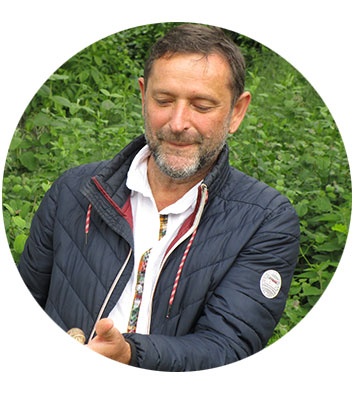Interview
‘We’re becoming closer’

Psychologist Franz Kernjak is one of a team of ten people who work at COPE. After spending 15 years in psychosocial work and three years as a Civil Peace Service expert in Latin America, he began working in Eschborn in February 2020. Since the outbreak of the coronavirus pandemic, demand for services has risen sharply.
Mr Kernjak, what kind of worries do people ring you with?
Working for GIZ in the partner countries is often challenging enough anyway, but the pandemic has caused many new worries and concerns. ‘Have I caught the virus? Have I unwittingly infected my mother?’ People feel guilty. The death toll was very high in some countries, with mass graves used in some cases. That weighs heavily on the relatives. Single people are reporting feelings of loneliness, while parents have had months of stress with the double pressure of working from home and homeschooling their children. And despite the pandemic, workloads remain high, because GIZ’s projects are still running. Many people are ringing COPE for the first time. They are often frustrated and exhausted. People are more likely to overcome their reluctance to seek help.
COPE
COPE is GIZ’s psychosocial counselling service and offers support to all staff in Germany and abroad, managers and accompanying family members. The team is made up of psychologists and counsellors with a range of additional qualifications and experience of working for the company in Germany and the field.
Why is it more tiring working from home?
Unlike in face-to-face meetings, we cannot fully recognise colleagues’ non-verbal signals in online meetings. Around 60% of non-verbal communication is lost. Unconsciously, we are always looking for this missing information. The situation is particularly stressful for new colleagues or new teams in which people didn’t know each other previously. That creates stress.
What advice do you give people ringing up in this situation?
Stress is also a physical reaction that you can work off physically. This includes sport or simple breathing exercises. The important thing is to set boundaries and structure your day: I’ll work from then until then, and after that I’ll take care of my children and help with homeschooling, and my team cannot reach me during that time. This is something you can communicate clearly.
Do people really accept that?
Yes, I don’t see any problems there. The important thing is to be open. That’s the only way you’ll find out that other people are in a similar situation. It makes you realise that you might not be the only one who isn’t sleeping well or who cannot concentrate properly due to the high level of pressure.
What new tasks are required of managers in the pandemic?
You don’t just bump into people in the office kitchen anymore, so it’s important to check in with everyone, for instance in a short virtual meeting in the morning. Managers should specifically ask how each individual in the team is getting on and what they are working on. Team leaders can certainly reach out to someone if they suspect that they are not coping well. They also need to spread optimism. The message should be that we can manage this together. In partner countries, it is also important to emphasise that no one is going to lose their job because of the pandemic. That’s not something that can be taken for granted.
Is the new working situation having any positive effects?
During my time in Latin America, I spent an incredible amount of time on buses and in cars. For many commuters, particularly in large cities, not having to travel to work is a huge relief. It enhances their quality of life. Changes are happening on an interpersonal level, too. People are becoming closer, and team spirit is growing. Knowing that people are there for one another is very important. Hopefully this effect will last beyond the pandemic.
Tips for dealing with stress
- Take some exercise
- Do breathing exercises
- Drink more water
- Practice mindfulness
- Accept the situation instead of fighting it
- Seek help if you need it: COPE can also put people in touch with external coaches and supervisors in the partner countries – in many different languages.
Contact: cope@giz.de
akzente January 2021
